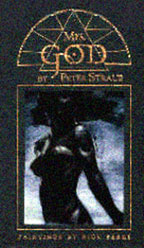

Mrs. God
If I felt any honor in the association, I might be tempted to take credit for the original inspiration behind this deliberately meaningless bit of narrative perversity, but honor is about the last thing I feel when I am made to consider MRS. GOD. On a brief stay at vertiginous Straub Manor after my host’s completion of KOKO and toward the end of an evening, which, given my friend’s unsociable notions as to meaning of “evening,” means somewhere around 2:30 a.m., I had sufficiently relaxed, despite the incessant wailing of saxophones and pounding of drums which seem invariably to accompany Peter’s lengthy “evenings,” to recount an amusing anecdote concerning the odd conditions in which one of my colleagues, an Associate Professor in Popham College’s English Department and a most eccentric chap in every way, found himself whilst engaged in research at a famous private library located within a magnificent country house in the north of England.
As ever preoccupied by the many “solos” he found compelling, constant telephone calls from thoughtless so-called friends and the several magazine articles he chose to skim during these hours, Straub appeared scarcely to attend to my anecdote. Yet when I had drawn rather irritated to its finish, he asked a number of questions about my eccentric colleague, his researches and the curiosities encountered during their pursuit. Was it actually the fact, he asked of me, that the young man was left utterly alone in the great house? And that gourmet dinners, prepared by invisible servants and invariably accompanied by an ever-rarer and more fabulous wine, had greeted his nightly appearance at the dining table? That one of the splendors of the library was the presence on its shelves of unpublished manuscripts by most if not all of the important Modernist writers? And that a visit to the village churchyard had suggested to my colleague some dark, unhappy secret in the history of the noble family which owned the great house?
Yes, yes, yes, I replied, all of that is true, wonderfully, puzzlingly true!
And is it also true, he asked of me, that this man went prowling through the cellars and discovered doll-houses of enormous size?
That, too, is the truth, I told him. “You know,” I said, “you might make a tale of this, some intriguing little tale of horror concerning an accursed family and a visiting scholar.” He rejected the notion out of hand – not his kind, of thing, he said, too fey, too much like a million other stories. You mean, I remarked to myself, too much like what you know you should be writing, but said no more about for the remainder of my visit.
Imagine, then, if you can, my shock and dismay when coming upon the novella entitled “Mrs. God” in both its incarnations, that of the final piece in that sadistic oddity, Houses without Doors, and that represented by the earlier version published by Donald M. Grant in a limited edition. Peter had incorporated nearly every detail of my anecdote into his tale! Not only that, he had made reference to my college, Popham, and inserted several unhappy incidents I had long before described to him and had no connection to the anecdote in question! This outright betrayal was mitigated only slightly by those subsequent remarks made to me by some of my colleagues to the effect that they had (inexplicably) enjoyed the novella, especially its references to our beloved College, and were delighted by this proof of the substantial influence I apparently exerted upon its author! The mind, as they say, boggles.
If influence him I must, would that it were to the production of anything other than MRS. GOD. Peter admits that he wished to invoke the example of one Robert Aickman, whose laboriously mandarin efforts sensible readers have long deemed unreadable. This is Freudian mumbo-jumbo of a deliberate, willed incoherence. I gather it has something to do with a baby. Those who suppose they have understood it need not trouble me with their interpretations. MRS. GOD represents no more than a foolish display of hostility to his readers in general, not only to me, but also and quite shamefully, also to me. As their biographies repeatedly prove, the writers of fiction, those poor devils, are prone to this sort of thing. The title of the novella has no discernible significance whatsoever.

Putney Tyson Ridge